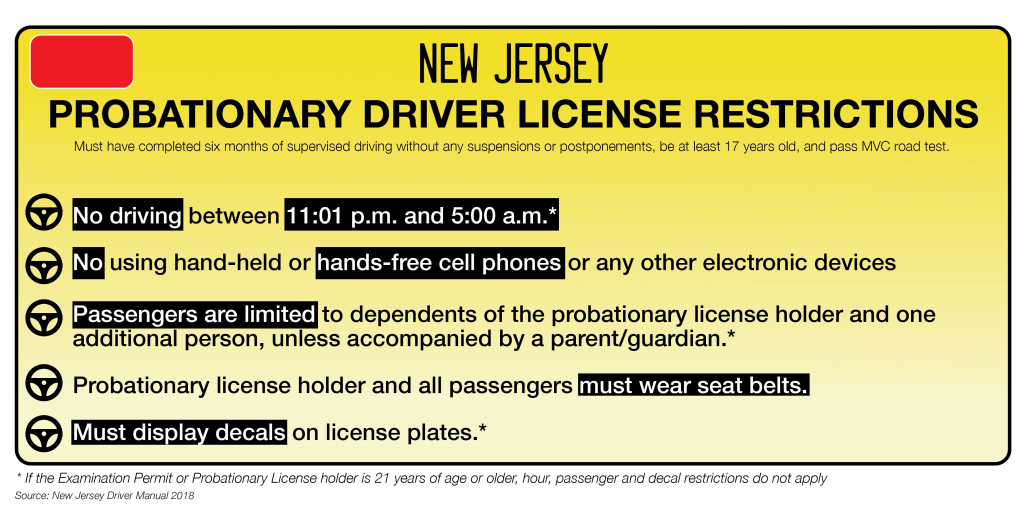
TRENTON – While crashes involving teenage drivers continue to trend downward in the state, the Division of Highway Traffic Safety (“the Division”) announced a public awareness campaign to commemorate milestone anniversaries for the New Jersey’s nationally recognized teen driver laws.
State law enforcement officials noted the 10-year anniversary of Kyleigh’s Law, which requires teens to affix stickers to their vehicles to identify them as novice drivers, and the 20-year anniversary of New Jersey’s Graduated Driver License (“GDL”) program, a three-tiered licensing process considered one of the most progressive and stringent teen driver measures in the country.
These laws are widely credited with helping to reduce fatal crashes among teen drivers. According to data from the New Jersey State Police, crash fatalities involving a teen driver (age 16 to 20) decreased by more than 47 percent between 2008 and 2018, dropping from 101 to 53.
During this period, the number of passengers under the age of 20 killed while riding in a car driven by a teen dropped by nearly 60 percent from 19 to 8.

Attorney General Gurbir S. Grewal said, “New Jersey’s licensing policies for young drivers is a model for the nation and the downward trend in crash fatalities involving teen drivers is a reflection of our proactive efforts, but there’s more work to be done.
“We’re celebrating the positive impact of our teen driver laws in a public outreach campaign to engage teens and their parents in helping us reach our goal of zero fatalities involving teen drivers,” Grewal added.
The anniversary campaign seeks to educate parents, teens and stakeholders on how the GDL program works to address the risks for novice drivers. Parents play a critical role as their teens’ number one driving teacher and coach, and are encouraged to schedule plenty of practice driving time with their teen during the permit and probationary license phases.
The campaign aims to help teens recognize the responsibility that comes with licensure and the importance of being positive role models for their peers and siblings, as well as speaking up when their friends drive unsafely.
Two videos were produced by the Division which were directed at parents and teens. Both videos point to the gains that have been made in reducing teen driver crashes and the need to “stick to it” when it comes to complying with the GDL and decal requirements.
The parent video highlights the decal’s effectiveness in reducing teen driver crashes and how teens with involved parents are less likely to engage in risky driving behaviors.
The teen video features “teen experts” to explain to young drivers what Kyleigh’s law is all about and how a little red sticker attached to their license plates can save lives.
The videos will be disseminated via social media, including popular teen platforms such as YouTube, Snapchat and Instagram, as well as the Division’s Facebook and Twitter accounts, and posted on the New Jersey Attorney General’s website.
NJ Division of Highway Traffic Safety Director Eric Heitmann said, “we see our GDL program and Kyleigh’s law as an example of the best in New Jersey. Our anniversary campaign is designed to raise awareness of the critical role our teen driver laws play in saving lives and how important it is for teens and their parents to abide by them.”
The law was named after Kyleigh D’Alessio, a 16-year-old from Washington Township (Morris County), who was killed in a 2006 single vehicle crash involving a teenage driver.
Kyleigh’s Law requires teens holding a probationary license to display red decals on the front and rear license plates of their vehicle when behind the wheel. The decal is intended to identify the driver’s provisional license status to law enforcement to assist them in enforcing curfews, passenger limits, and other provisional license restrictions.
The state’s GDL law is a three-step process – learner’s permit, probationary (restricted) license and basic (unrestricted license) – designed to help new drivers gradually build skill, while minimizing risk. It prohibits late night driving and the use of electronic devices, limits the number of passengers, requires the use of seat belts and bans plea bargaining for moving violations.
For information on the anniversary campaign, visit njsaferoads.com/sticktoit/.






